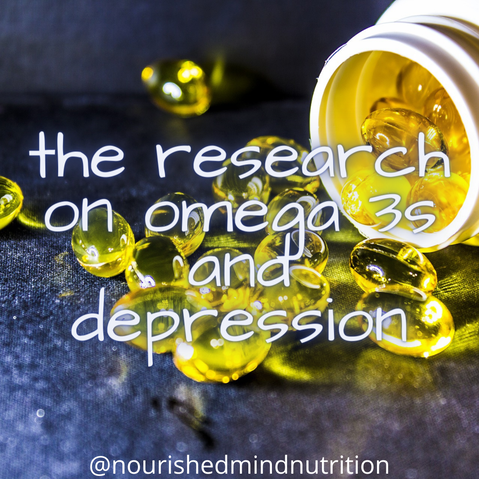 If you’ve ever wondered, “Should I take a supplement for this?” this is the post for you. We’ll walk through a decision-making tool to help you figure out when you should take a vitamin/mineral supplement, and when you probably shouldn’t (or simply don't need to). Let’s note up front that I’ll be speaking generally in this post, because there’s no way we could cover everything in one blog. I’m also specifically talking about vitamin and mineral supplements here; some of this can be generalized to other categories of supplements, but not all of it. And as always, I highly recommend talking to a doctor or dietitian about your specific history and concerns! So – when should I take a supplement?
There’s a growing body of evidence that people with mental health issues specifically may have higher needs for various nutrients. As one small example, there are some connections between genetic B vitamin processing disorders and mood disorders, which means that some people with depression, bipolar disorder, and schizophrenia may need more or different forms of various B vitamins to meet their individual needs.
Often, when someone’s labs show a less-than-optimal level of a vitamin or mineral and they have substantial dietary changes to make, I’ll recommend a supplement temporarily and continue to monitor their intake of that nutrient until I feel they’ve reached a point where they are consistently getting enough from their diet alone.
OK then, so when shouldn’t I take a supplement?
In general (with some notable exceptions), the nutrients we make into supplements are contained in foods we could be and should be eating. And typically, the packaging of those nutrients within a food are more “friendly” to our bodies because:
I think there’s also an argument to be made that we just don’t know all the nutrients that are out there yet! We are constantly discovering new phytochemicals and nutraceuticals that turn out to be incredibly important for optimal health and disease prevention. We certainly don’t want to miss out on these nutrients by thinking that we can just take supplements and then we don’t have to eat our fruits and veggies. The bottom line: The main questions when deciding whether to take a supplement are:
Interested to learn more? If you have any questions, feel free to comment below or message me directly. If you’d like more personalized guidance, schedule an appointment or a free 15-minute discovery call with me! I’d love to work with you. Erica Golden, RDN, LD, IFNCPMental health, gut health, and eating disorder dietitian
0 Comments
 In the realm of nutritional psychiatry, some of the best evidence is for the ability of omega-3 fatty acids, and specifically fish oil (which contains fatty acids called EPA and DHA, among others) to help treat depression. So what exactly is the evidence, and what do we do with it? To start, let’s first define what we mean by fish oil. Out of all the different types of fats and oils, there are just a couple that are considered essential for our bodies – meaning that we can’t make them on our own. One of those essential fatty acids is ALA, or alpha linolenic acid, an omega-3 fatty acid. (The other is LA, or linoleic acid, an omega-6 fatty acid.) ALA is considered essential because it is the precursor to two very important fatty acids: DHA and EPA. However, a relatively small percentage of ALA is actually converted to either of these in most people. So while we can certainly eat flax seed, chia seeds, and walnuts and get a fair amount of ALA from these foods, the most efficient way to get EPA and DHA is to eat fish, especially the cold water oily fish like salmon, sardines, anchovies, herring, and mackerel, or sea vegetables like nori (seaweed) or dulse (kelp). The average healthy person can meet their needs for EPA and DHA by eating a serving of fish twice a week (preferably fish that is responsibly sourced and low in mercury). But for some people, that may not actually be enough to meet their needs for optimal health. Some mental health conditions appear to make this list. I want to preface by saying that a fish oil supplement is not for everyone. Decisions about supplements should always be made in discussion with a doctor or dietitian, because there may be interactions with other medications or concerns about other conditions that could actually make taking some supplements dangerous. For example, fish oil can increase bleeding risk and interact with some medications, like blood thinners. There also has been some evidence that for some people and some conditions, the risks can outweigh the benefits, so a conversation with a knowledgeable professional is always a good idea. For major depressive disorder specifically, however, the evidence is mounting that routine supplementation with EPA can make a significant difference in depressive symptoms. There’s a good chance that one day soon, fish oil supplements may be standard of care either as a first-line therapy or an adjunctive treatment (meaning, alongside standard medication). The dosages looked at in most studies is around 2 grams per day (for reference, you can get about 2 grams from a 4-ounce serving of salmon). Some of the mixed results in the research seem to come from varying amounts of EPA and DHA in the supplements the studies used. For major depression, most of the evidence seems to point to either pure EPA or at least a 2:1 ratio of EPA to DHA. The link between omega-3s and depression seems to lie in the inflammatory nature of depression. Studies have shown that people with higher levels of chronic inflammation linked to depression are more likely to respond to treatment with EPA. Again, before starting any new supplement, it's always prudent to talk to a health professional familiar with your personal needs and conditions, as well as with expertise in mental health treatment. It's often a good idea to use foods first to improve your nutritional status, rather than jumping straight into supplements. You might consider starting with increasing your intake of oily fish and trying sea vegetables first. If you do decide to take a supplement, collaborate with a healthcare professional to help you make an informed decision about which supplement type and brand to take. Interested to learn more? If you have any questions, feel free to comment below or message me directly. If you’d like more personalized guidance, schedule an appointment or a free 15-minute discovery call with me! I’d love to work with you.
|
AuthorErica Golden, RDN Archives
March 2024
Categories |
 RSS Feed
RSS Feed
